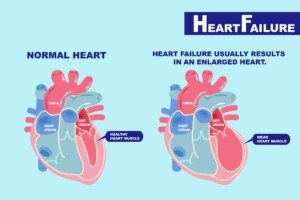
When one thinks of obesity’s harm to the heart, it’s usually clogged arteries.
But being fat can impair the heart’s pumping action: heart failure.
- The heart fails to pump the amount of blood it’s supposed to.
- And/or, the heart’s chambers fail to fill up with the amount of blood they’re supposed to before each beat.
“Extra fat around the heart can be dangerous because of the mechanical constriction of the heart muscle,” says Susan L. Besser, MD, with Mercy Medical Center, Baltimore; Diplomate, American Board of Obesity Medicine and board certified by the American Board of Family Medicine.
“If the heart is surrounded by fat, it can’t beat as efficiently, and that can lead to heart arrhythmias or heart failure.”
These days, “congestive” heart failure is becoming increasingly referred to as chronic heart failure, since not all patients with this common disease suffer from congested fluid in the body.
Being Fat Is As Much a Risk for CHF As It Is for Heart Attack or Stroke

Shutterstock/nger Anne Hulbækdal
Exactly how obesity creates a risk factor for congestive heart failure is not clearly understood.
Researchers believe the mechanism may be an indirect effect, in that all the extra internal fat often leads to high blood pressure, heart attack or type 2 diabetes … which all put a person at risk for CHF.
However, some researchers indeed believe that obesity has a direct effect on heart muscle.

Shutterstock/EstherQueen999
Thin people get CHF too, but you must realize that CHF has multiple risk factors. One is obesity.
Others are lack of exercise, smoking, untreated sleep apnea, and of course, high blood pressure, heart attack and diabetes.
The mechanical problem that’s created by the excess fat surrounding the heart may not be the only pathway that leads to CHF in the very overweight person.
Fat cells may behave as endocrine tissue, secreting harmful substances.
Weight Affects Heart Function
A study by Thomas H. Marwick, PhD, compared the left ventricles of normal-weight people, with the left ventricles of severely obese people.

Shutterstock/ Motortion Films
In the overweight participants, there was a very weakened ability of cardiac muscle to contract, and a diminished ability of cardiac muscle to fully relax.
The full-relax is important for enabling the ventricle to be refilled with blood during rest periods between the heartbeats.
The study showed impairments of left ventricular function in mildly obese, as well as overweight, subjects.
“The study showed a direct relationship between the level of obesity and the degree of myocardial dysfunction,” says Dr. Marwick in the paper.
And this finding was independent of other risk factors.
“We think this indicates a direct metabolic effect of obesity on the heart muscle,” says Dr. Marwick.
More than half a million cases are diagnosed in the U.S. every year, and the condition kills about 53,000 Americans yearly, as primary cause of death.
However, if congestive or chronic heart failure was named on death certificates as contributing cause of death, the annual death rate would jump to over 260,000.
Congestive failure usually starts in the left ventricle, and may be diagnosed as diminished left ventricular function.
Regular exercise (strength training and cardio) plus prevention of obesity and even overweight, will go a dynamically long way in preventing congestive or chronic heart failure.
 Dr. Besser provides comprehensive family care, treating common and acute primary conditions like diabetes and hypertension. Her ongoing approach allows her the opportunity to provide accurate and critical diagnoses of more complex conditions and disorders.
Dr. Besser provides comprehensive family care, treating common and acute primary conditions like diabetes and hypertension. Her ongoing approach allows her the opportunity to provide accurate and critical diagnoses of more complex conditions and disorders.
 Lorra Garrick has been covering medical, fitness and cybersecurity topics for many years, having written thousands of articles for print magazines and websites, including as a ghostwriter. She’s also a former ACE-certified personal trainer.
Lorra Garrick has been covering medical, fitness and cybersecurity topics for many years, having written thousands of articles for print magazines and websites, including as a ghostwriter. She’s also a former ACE-certified personal trainer.
.









































